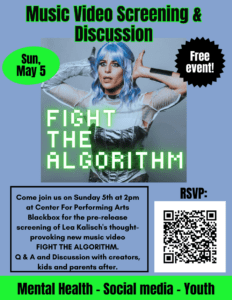Lea Kalisch, a Swiss-born, Minneapolis-dwelling creative, is gearing up for the release of her original song and music video, “FIGHT THE ALGORITHM.”
This song and video speaks to the often harmful effects of social media on mental health, and with it, Kalisch aims to spark a conversation about the pervasive impact of digital platforms on youth and society.
The music video, starring Kalisch and 15 local performers and directed by Jon Steinhorst, will be pre-screened on Sunday at 2 p.m. at the Center for Performing Arts, followed by a discussion. The video’s official release is set for May 7.
“The idea is to have an open conversation with kids and adults about the video’s message, and social media and phone use in general,” said Kalisch.
Admission is free; reserve your spot at the Eventbrite page.
The video, originally titled “F*** the Algorithm,” was renamed to ensure broader accessibility and encourage educational discussions, particularly among younger audiences.
“It was always called ‘F*** the Algorithm’ from the day I made it,” Kalisch said. “I don’t even know how I came up with it. It was just like, fuck the algorithm. I’m so done with this. Fuck it.” The original title was reflective of her frustration with how social media platforms prioritize profit over artistic authenticity.
The shift to a more school-friendly title was a strategic move to facilitate the video’s use in educational settings, a key audience for Kalisch’s message. “We did get a school to give us their space [for the video],” she said.
The inspiration for “FIGHT THE ALGORITHM” came during the pandemic: “I wrote it sometime during the pandemic when we were spending a lot of time online, and more time on social media,” she said.
Kalisch has a nuanced view of social media, understanding that it can be alternatively useful and oppressive. “What I need to be as an artist is more like a salesperson using apps that are made not for artists to succeed, but for people to make money,” she said. She explained the design of platforms for profit, where user engagement often translates directly into revenue, minimizing the content’s artistic or educational value.
 The project is supported in part by Margarita Louis-Dreyfus, a Swiss businesswoman deeply involved in initiatives protecting children from digital harm. Kalisch has been able to network with experts in the field, including Jonathan Haidt, a social psychologist who has agreed to help promote the video. Haidt recently published a book arguing that smartphones, and all their associated apps and social media platforms, are the root cause of skyrocketing youth depression and mental health issues.
The project is supported in part by Margarita Louis-Dreyfus, a Swiss businesswoman deeply involved in initiatives protecting children from digital harm. Kalisch has been able to network with experts in the field, including Jonathan Haidt, a social psychologist who has agreed to help promote the video. Haidt recently published a book arguing that smartphones, and all their associated apps and social media platforms, are the root cause of skyrocketing youth depression and mental health issues.
“The question of how am I going to release this video was crucial because usually you release things into the social media universe and you’re relying solely on the algorithm. With this video, I can’t just surrender to the algorithm, nor do I want to,” said Kalisch.
As for the impact Kalisch hopes the video will have, views on social media are less important to her than meaningful discussions. “How much impact can this have, even if this goes viral under ‘F*** the Algorithm’ on social media? Nothing that goes viral on social media has, in my opinion, a deep impact on people’s behaviors,” she said.
Ultimately, it’s about starting conversations. “What does impact mean? Does impact mean virality and views, or could it mean deep discussion with only seven parents and five teachers and three kids?” she said. “It’s the message that overrides the artist here.”
As ‘FIGHT THE ALGORITHM’ makes its debut, Lea Kalish has sparked a dialogue about the impact of social media and invites all those affected to join the conversation.



















